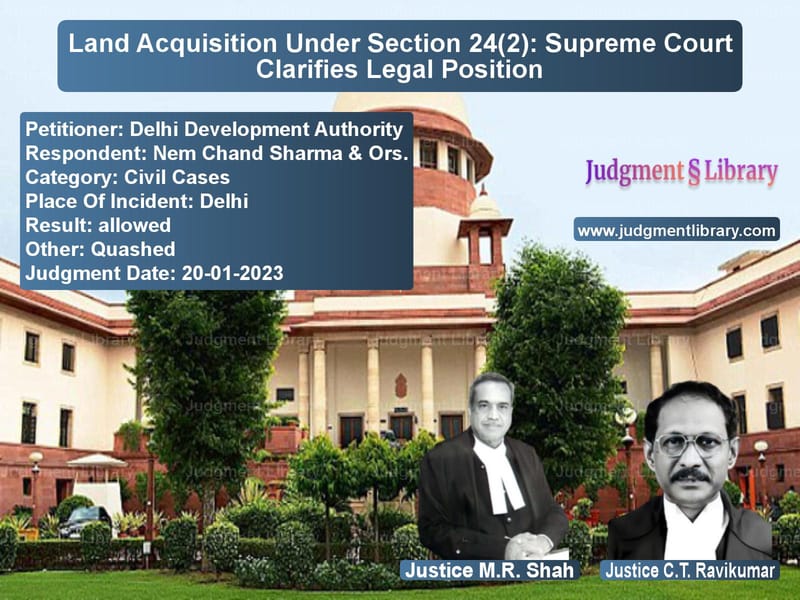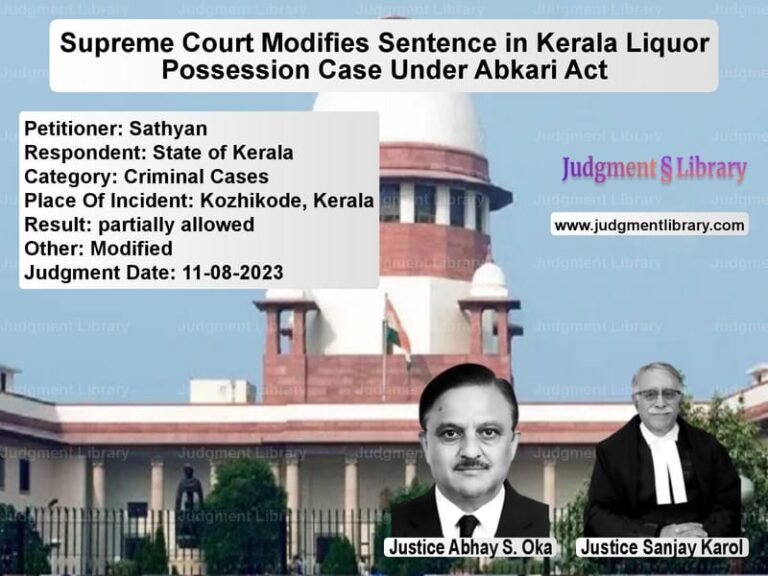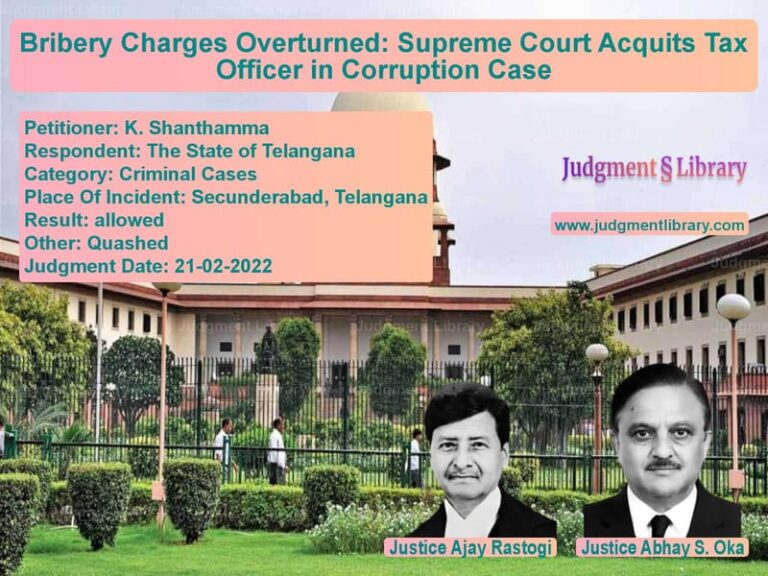Land Acquisition Under Section 24(2): Supreme Court Clarifies Legal Position
The case of Delhi Development Authority v. Nem Chand Sharma & Ors. revolves around the application of Section 24(2) of the Right to Fair Compensation and Transparency in Land Acquisition, Rehabilitation, and Resettlement Act, 2013. The Supreme Court examined whether the acquisition of land initiated under the Land Acquisition Act, 1894, had lapsed due to alleged non-payment of compensation and lack of possession by authorities.
Background of the Case
The case arose when the Delhi High Court ruled in favor of the landowners and declared that the land acquisition proceedings had lapsed under Section 24(2) of the 2013 Act. The Delhi Development Authority (DDA) challenged this decision before the Supreme Court, arguing that possession had been taken and compensation had been duly processed.
The land acquisition was initiated under the Land Acquisition Act, 1894. The award was passed, but disputes regarding compensation and possession arose. The High Court relied on the decision in Pune Municipal Corporation v. Harakchand Misirimal Solanki to hold that the acquisition had lapsed. However, the Supreme Court’s Constitution Bench in Indore Development Authority v. Manoharlal later overruled the Pune Municipal Corporation decision, necessitating a reconsideration of the legal position.
Legal Issues Considered
The Supreme Court examined the following key legal questions:
- Whether land acquisition proceedings lapse under Section 24(2) if compensation has not been paid but possession has been taken.
- Whether the High Court erred in relying on the now-overruled Pune Municipal Corporation judgment.
- Whether Section 24(2) of the 2013 Act should be interpreted in light of the Constitution Bench ruling in Indore Development Authority.
Arguments by the Appellants (Delhi Development Authority)
The DDA contended that:
- Possession of the land had been taken and handed over to the beneficiary department on 27.12.1990, with the remaining portion taken on 09.02.2007.
- As per the ruling in Indore Development Authority, if possession has been taken, the acquisition does not lapse merely because compensation was not paid.
- The High Court relied on the Pune Municipal Corporation case, which has been explicitly overruled.
- Landowners cannot use administrative delays as grounds to claim lapse of acquisition.
Arguments by the Respondents (Nem Chand Sharma & Ors.)
The respondents argued that:
- Since compensation was not paid, the acquisition should be deemed lapsed under Section 24(2) of the 2013 Act.
- The High Court correctly applied the principles set out in Pune Municipal Corporation.
- Failure to follow due process in awarding compensation rendered the acquisition invalid.
Supreme Court’s Judgment
The Supreme Court ruled as follows:
- High Court’s reliance on Pune Municipal Corporation was incorrect: The Court reaffirmed that this case was overruled by Indore Development Authority.
- Acquisition does not lapse if possession has been taken: The Court noted that under Section 24(2), both conditions—non-possession and non-compensation—must be met for an acquisition to lapse.
- Since possession was taken, acquisition remains valid: The Court found that official records confirmed possession, making the acquisition legally sound despite disputes over compensation.
- High Court’s decision was overturned: The Supreme Court quashed the High Court’s ruling and upheld the government’s acquisition of the land.
Analysis of the Judgment
The ruling clarifies the legal position on land acquisition and prevents unwarranted challenges based on procedural delays.
Implications for Landowners
- Landowners cannot claim lapse of acquisition merely due to non-payment of compensation if possession has been taken.
- Legal challenges to acquisition must align with the interpretation provided in Indore Development Authority.
Implications for the Government
- The ruling strengthens the government’s authority in land acquisition matters.
- Proper documentation of possession is crucial in preventing future disputes.
Implications for Future Land Acquisition Cases
- The judgment provides a definitive interpretation of Section 24(2) of the 2013 Act.
- It prevents unnecessary litigation and ensures that public infrastructure projects are not hindered by retrospective claims.
Conclusion
The Supreme Court’s judgment in this case reinforces the legal stability of land acquisition laws and ensures that procedural lapses do not automatically invalidate government projects. By aligning with the Constitution Bench ruling in Indore Development Authority, the Court has provided clarity on how Section 24(2) should be interpreted.
Petitioner Name: Delhi Development Authority.Respondent Name: Nem Chand Sharma & Ors..Judgment By: Justice M.R. Shah, Justice C.T. Ravikumar.Place Of Incident: Delhi.Judgment Date: 20-01-2023.
Don’t miss out on the full details! Download the complete judgment in PDF format below and gain valuable insights instantly!
Download Judgment: delhi-development-au-vs-nem-chand-sharma-&-o-supreme-court-of-india-judgment-dated-20-01-2023.pdf
Directly Download Judgment: Directly download this Judgment
See all petitions in Property Disputes
See all petitions in Public Interest Litigation
See all petitions in Judgment by Mukeshkumar Rasikbhai Shah
See all petitions in Judgment by C.T. Ravikumar
See all petitions in allowed
See all petitions in Quashed
See all petitions in supreme court of India judgments January 2023
See all petitions in 2023 judgments
See all posts in Civil Cases Category
See all allowed petitions in Civil Cases Category
See all Dismissed petitions in Civil Cases Category
See all partially allowed petitions in Civil Cases Category







